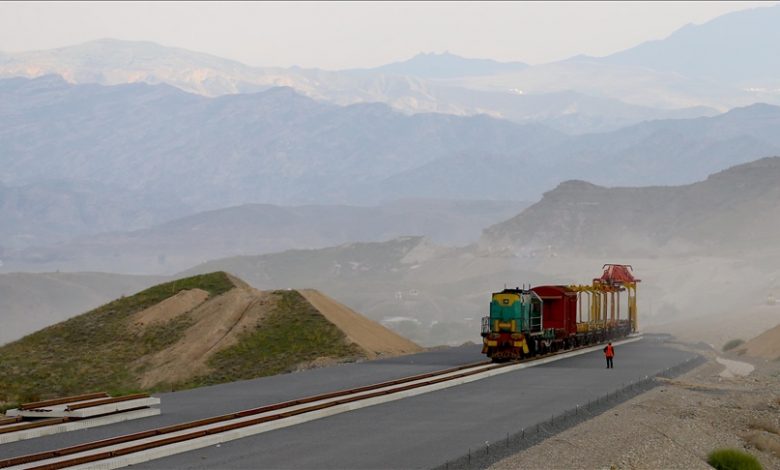Analysis: Azerbaijan and Türkiye remain committed to Zangezur Corridor

US and its allies essentially forced the route through Iran by rejecting or failing to assist Zangezur
US and its allies essentially forced the route through Iran by rejecting or failing to assist Zangezur
– Different approaches on corridor can be seen: Türkiye and Azerbaijan consider it instrument for regional cooperation and normalization; Armenia and Iran see it as danger
The Zangezur Corridor issue resurfaced in Azerbaijan President Ilham Aliyev’s most recent discussion with the local press, when he reaffirmed Azerbaijan’s position on the planned corridor: “People and goods should pass from Azerbaijan to Azerbaijan without any checks. Otherwise, Armenia will remain an eternal deadlock, if the route I mentioned is not opened,” he said. [1]
On Jan. 7, just a few days before Aliyev’s interview, Turkish Transport and Infrastructure Minister Abdulkadir Uraloglu said that the Azerbaijani segment of the Zangezur Corridor, spanning from the capital Baku to Horadiz, is nearing completion. He added that the 224-kilometer (140-mile) Turkish section of the road will take five years to construct and that he is confident it will be finished by 2028. It is useful to remember Turkish President Recep Tayyip Erdogan’s statement on the flight back from Nakhichevan last Sept. 26 about the corridor: “Realization of this corridor, which is very important for Türkiye and Azerbaijan, is a strategic issue, and it must be completed.” [2]
Iran issue and US reaction
Meanwhile, as a result of Iran’s perception of a threat from the Zangezur Corridor, Azerbaijan and Türkiye made significant moves against Iran. A new railway, highway connection, communication and energy supply lines will be established between the Eastern Zangezur economic zone and the Nakhchivan Autonomous Republic of the Republic of Azerbaijan via Iran, according to a memorandum of understanding signed between Azerbaijan and Iran on March 11, 2022. For this purpose, four bridges will be built on the Araz River, two for automobiles/pedestrians and two for railways. In addition, communication and energy supply infrastructure would also be constructed. [3] Azerbaijan and Türkiye’s major goal was to appease Iran by stating that they do not want to exclude Iran from regional projects. In fact, on Oct. 7, Azerbaijani and Iranian officials attended a groundbreaking ceremony in Azerbaijan for a highway bridge and customs infrastructure on the two countries’ borders, in line with a memorandum of understanding signed in March 2022. [4]
However, these signs triggered a response from the United States. “A transport corridor involving Iran will face a resolute response,” said James O’Brien, US assistant secretary of state for European and Eurasian affairs, on Nov. 15. O’Brien’s comments elicited some reaction and surprise in Azerbaijan. [5] Because while Azerbaijan had been insisting on the Zangezur Corridor for a long time, US allies were accusing Azerbaijan of threatening the territorial integrity of Armenia.
In response to O’Brien, President Aliyev conveyed these remarks during an interview with the local press on Jan. 10. Emphasizing his stance, he suggested that if there is opposition to the road passing through Iran, it is possible to create favorable conditions for Zangezur, as previously mentioned. This, he asserted, would obviate the necessity for an alternative route. [6] Subsequently, following the delay in the Zangezur Corridor, the road through Iran was opened.
There was a contradiction, because the US and its allies had essentially forced the route through Iran to open by rejecting or failing to assist Zangezur. Thus, on Dec. 2, Iran’s ambassador to Azerbaijan, Seyed Abbas Mousavi, who did not speak much about this issue, said, “Everyone is aware that the Zangezur Corridor idea will not come true,” sending an early message that Iran had won the Zangezur Corridor issue.
Nevertheless, during a Dec. 5 meeting with foreign experts, Aliyev asserted that there were no territorial claims against Armenia. However, he stressed the importance of unhindered transportation of products from Azerbaijan to Azerbaijan, signaling that the Zangezur Corridor strategy remains active. Just 10 days later, an article by Armenian expert Sergey Melkonian was featured by the official Iranian news agency. He claimed that Baku and Ankara had not abandoned their expansionist policies, highlighting the continued relevance of the Zangezur Corridor issue in this context. [7] This meant that Iran continued its stance against Zangezur, despite the important gesture of Azerbaijan and Türkiye towards Iran.
Armenia’s fear of opening Zangezur Corridor
The opening of the route via Iran, on the other hand, increased Armenia’s fear of being cut off from regional projects. At an international conference in Tbilisi, Armenian Prime Minister Nikol Pashinyan presented the Crossroad for Peace project. Armenian authorities even launched this effort against Zangezur and sought foreign assistance. However, Azerbaijan saw this as a sham and said that it would not happen without Zangezur. Azerbaijan and Türkiye are currently of the same opinion, believing that Armenia has no other option. On Jan. 10, President Aliyev said they will not establish transportation routes with Armenia if Zangezur is not open on our terms. In response to Aliyev’s statement, Pashinyan said transportation routes with Armenia would not be established unless Zangezur is opened on terms acceptable to them. Pashinyan clarified that they are not against the construction of railways and roadways through Zangezur but stressed that they want to proceed by adhering to Armenian law.
Following that, on Jan. 11 Iran’s ambassador to Armenia issued another statement stressing that any breach of Armenia’s sovereignty and territorial integrity is unacceptable to Iran. [8] In truth, this declaration is a warning to both Azerbaijan and Armenia not to open the Zangezur Corridor.
Today, three approaches are observed in relation to the Zangezur Corridor: Türkiye and Azerbaijan consider it an instrument for regional cooperation and normalization; Armenia and Iran see it as a danger. There are also the US and the European Union, which have contradictory aims and policies. The last two groups of countries are now delaying the development of the corridor. However, if Armenia shows political will, this corridor will be completed quickly. If it takes a realistic approach, Armenia has no choice but to participate in regional projects in the medium and long term.
Source: AA / Dr. Cavid Valiyev





